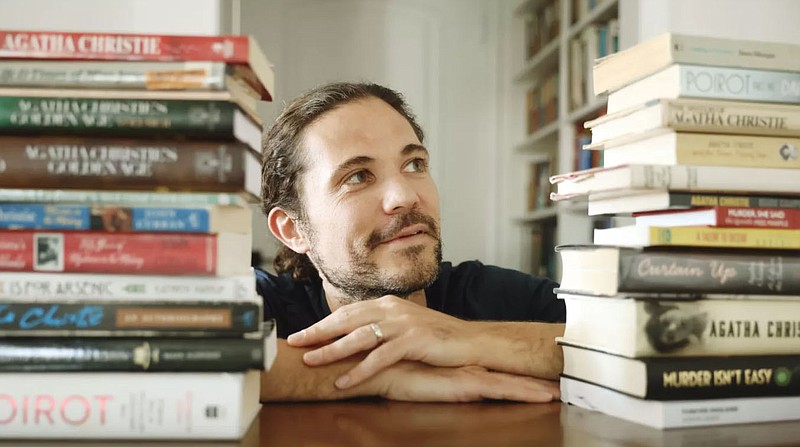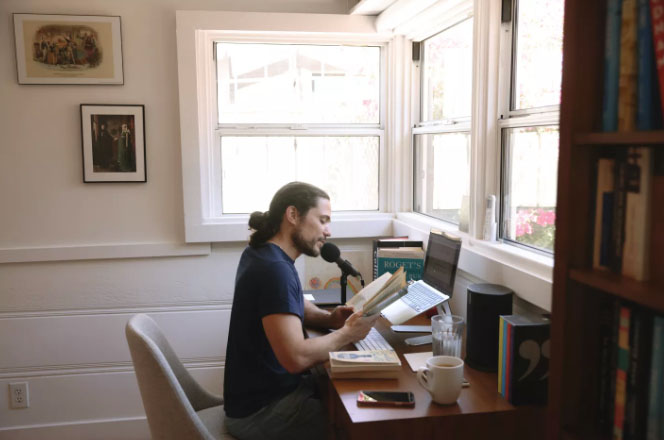At first glance, Kemper Donovan's backyard bungalow appears perfectly normal for this Santa Monica neighborhood, but a few clues suggest otherwise.
A map of the English county of Devon. A copy of "The Poisoner's Handbook." A professional-looking microphone perched on a wooden desk. And then there's the enormous portrait of Agatha Christie hanging next to the guest bed.
If you use your little gray cells -- as Christie's fictional detective Hercule Poirot liked to say -- you might deduce that this is where Donovan, 43, records the long-running podcast, "All About Agatha." In it, he and co-host Catherine Brobeck set out to read and rank all of Christie's 66 mystery novels and discuss them in exhaustive detail.
For six years, thousands of Agatha Christie enthusiasts across the globe have downloaded the podcast for what one listener described as a "joyfully geeky" take on the Queen of Crime's expansive canon. In addition to the mystery novels, Christie penned 14 short story collections, two memoirs, more than 20 plays and six non-mystery novels under the pseudonym Mary Westmacott.
Donovan and Brobeck discussed all of it with glee. As "Agathologists," they lectured at the University of Cambridge on the collective catharsis of the denouement -- when the detective gathers everyone in the drawing room to reveal the killer -- gave media interviews on the steady stream of new Christie adaptations, and became beloved pillars of the close-knit community of devout Christie fans and scholars.
Today, the podcast averages just under 100,000 downloads a month with most of its listeners in the U.S., the U.K., Canada, Australia, Germany and Scandinavia.
The co-hosts frequently disagreed. Donovan was a die-hard Miss Marple fan; Brobeck was Poirot all the way. You could almost hear Brobeck's eyes roll whenever Donovan attempted a phrase in French, or read, once again, from Christie's autobiography. But even when they argued, they made each other laugh.
Then, suddenly and tragically, Brobeck died last November, just days after her 37th birthday, from a previously undetected genetic disorder. Hundreds of listeners reached out to Donovan to express their shock and grief. Many felt they had lost a friend.
At the time of Brobeck's death, she and Donovan had explored 60 novels. With just six left to review, Donovan decided to keep the podcast going.
The final novel episode of "All About Agatha," released in September, was dedicated to "Curtain," the last book published in Christie's lifetime. It included a full recitation of Poirot's "obituary," which ran on the front page of the New York Times in 1975, and several passages from the book "Poirot and Me" by David Suchet, the British actor who played the detective for 25 years on the beloved ITV series.
That podcast lasted 3 hours, 49 minutes, the longest installment yet. As the project neared its end, the episodes had been getting longer and longer. Donovan and I grew up in the same town in New York, and we've been close friends since high school, so I know he can talk at length. But it was clear something else was going on besides his natural chattiness.
When I asked him about it, he admitted he couldn't help himself.
"For a lot of reasons, I don't want this to end," he said.
***
It is tempting to say that Agatha Christie is having a moment. This year alone has seen the release of Kenneth Branagh's film adaptation of "Death on the Nile," Hugh Laurie's television adaptation of "Why Didn't They Ask Evans?" and a new biography by the British historian Lucy Worsley, "Agatha Christie: A Very Elusive Woman." A new collection of Miss Marple short stories written by some of the foremost mystery authors working today was released in September.
But as any Christie devotee will tell you, Agatha Christie, who died at age 85 in 1976, is always having a moment. Her books have sold more than 2 billion copies worldwide. (She's been outsold only by the Bible and Shakespeare.) Her play "The Mousetrap" opened in London's West End in 1952 and ran until it was shut down by covid-19, making it the longest-running play in history. It reopened in May 2021.
What accounts for her enduring appeal?
The answer, said Mark Aldridge, a historian and author of "Agatha Christie on Screen" and "Agatha Christie's Poirot: The Greatest Detective in the World," is simple.
"She's a genius," he said. "And I'm not being reductive when I say that. People think she had some commercial trick or beautiful secret, but the truth is that she's just brilliant."
For John Curran, author of "Agatha Christie's Secret Notebooks: Fifty Years of Mysteries in the Making," the key is her accessibility.
"She tells a very good, clever story, and she tells it readably," he said. "Readability is my No. 1 factor for Christie's success. She had the knack, and it's a very underestimated one."
It's also a topic that came up on the podcast.
"The true mystery of Agatha Christie is, 'Why her?'" Donovan said.
Donovan's theory is that there is something almost archetypal about her work. "It's on the same level of mythology," he said. "You can come back to her again and again like you do with myths and fairy tales."
Love triangles featured frequently in books like "Death on the Nile" (ranked 9) and "Five Little Pigs" (No. 1) just as they do in myths. And, like many myths, her books presented a specific morality.
Donovan believes Christie's primary concern was not vengeance, but the pursuit of truth. Her books rarely ended with tales of the killer's punishment, focusing instead on the freedom innocent protagonists are granted when the truth comes to light.
But this perspective is a work in progress. "It's the million-dollar question, and I want to be trying to answer that question, basically for the rest of my life," he said.
***
Donovan and Brobeck were voracious and early readers and both devoured Christie novels in childhood.
"Catherine learned to read when she was 4 and quickly outgrew mysteries like the 'Nancy Drew' series," Brobeck's mother, Linda Brobeck, said. "There was nothing scandalous in Agatha Christie, so she started reading those."
Although they both maintained a fondness for Christie, they soon moved on to other literature. Catherine Brobeck studied Russian in college so she could read Tolstoy in his native language, and more recently was working on a guide of Joan Didion's Los Angeles. Donovan, a self-proclaimed Anglophile, wrote his undergraduate honors thesis on Wilkie Collins, a 19th century author whom some consider to be the inventor of the detective novel.
They met in L.A. in 2008, when Donovan started dating Brobeck's college friend Adam Milch, whom he later married. When the conversation turned to "Anna Karenina," their friendship was cemented.
By 2016, Donovan, who previously worked as a manager for screenwriters, had published his first novel, "The Decent Proposal," a contemporary love story set in L.A. Brobeck, also a writer, was making ends meet as an assistant in an entertainment law office.
One evening, Donovan and Milch had a suggestion for Brobeck: podcasting. She was smart, funny, well-read and she loved to talk. The ultimate phone friend.
Brobeck liked the idea, but she didn't want to do it alone. Donovan remembered a comment he'd once made to her about how the Poirot television series made a tonal swerve in the later seasons, becoming less twinkly and more gloomy. Brobeck had understood instantly.
And so that evening they hatched a plan for what became "All About Agatha." And if it stopped being fun, they agreed, they would feel no guilt about abandoning ship.
Brobeck's caveat was that they at least try to make it to "The Murder of Roger Ackroyd," (ranked No. 3) Christie's sixth novel and the first of what fans consider to be the Christie Crown Jewels, which also include "And Then There Were None" (No. 2) and "Murder on the Orient Express" (No. 7).
They would score each novel on a series of categories that included plot mechanics (the way the mystery is crafted) and credibility (whether it could happen in real life). Among other criteria was a category called "series-long characters," which allowed them to examine how effectively Christie wrote recurring characters like Miss Marple and Poirot.
A category called "setting and tone" gave them space to discuss how well she evoked the setting of the mystery, as well as their general feelings about the book -- if they found it hard to read, or couldn't put it down.
They would also deduct points for what they called "depictions stuck in their time" as a way to acknowledge Christie's xenophobic, misogynist, racist, homophobic and ableist passages. (She also displays a special distaste for nontraditional families.)
"The books are messy the way humanity is messy, and this is an acknowledgment of that," Donovan said.
When the podcast started, Brobeck was living in an apartment near the Grove, and Donovan had a Santa Monica condo near the beach. To avoid traffic they decided to record over the phone. (It was an L.A.-based podcast after all.)
To improve the sound quality in those early days, they both recorded in closets. But despite these hiccups, Christie scholars started listening in right away.
"I remember thinking, 'This is exactly what I want,'" said Sophie Hannah, a British poet, novelist and author of a new series of Poirot novels that have been authorized by Christie's estate. "It was a podcast hosted by two people who are not only as keen on Agatha Christie as I was, but who wanted to talk about her in granular detail."
©2022 Los Angeles Times. Visit at latimes.com. Distributed by Tribune Content Agency, LLC.


